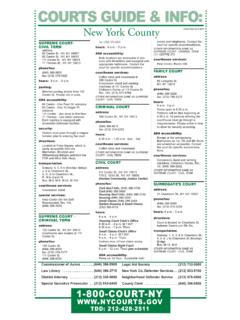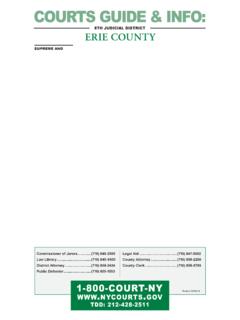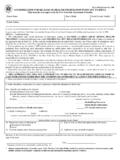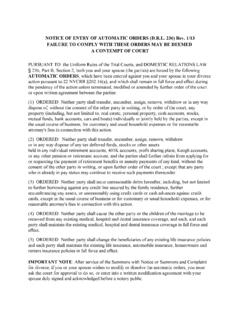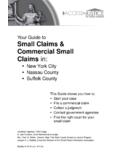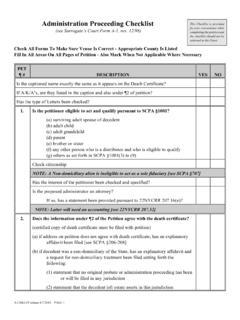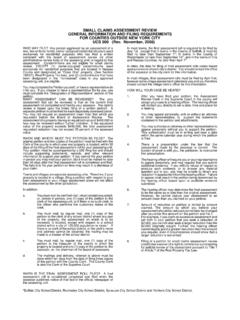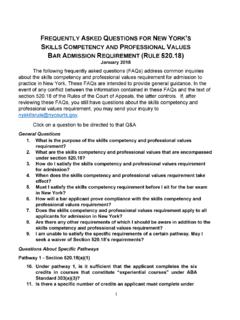Transcription of IN THE NEW YORK STATE ITY TOWN VILLAGE OURTS
1 N E W Y O R K S TAT E U N I F I E D C O U R T S Y S T E M. A GUIDE TO. small CLAIMS. IN THE. NYS CITY, TOWN. AND VILLAGE COURTS. JUDITH S. KAYE JONATHAN LIPPMAN. CHIEF JUDGE CHIEF ADMINISTRATIVE JUDGE. Back Cover A GUIDE TO small CLAIMS COURT. TABLE OF CONTENTS. What is small Claims Court? .. 2. Who can use small Claims Court? .. 2. Where are the small Claims Courts Located? .. 3. How do I Start a small Claims Case? .. 3. Must I Know the Defendant's Correct name ? .. 4. What is a Counterclaim? .. 4. Can I Change the Date of my Hearing? .. 5. How do I Ask for an Adjournment? .. 5. What Should I Do on the Day of My Hearing? .. 6. What Should I Do When My Case is Called? .. 6. Should I Choose a Judge or an Arbitrator? .. 6. Can I Demand a Jury Trial? .. 8. Preparing for Hearing/Trial.
2 8. How is a Hearing/Trial Conducted? .. 9. Disclosure of Assets .. 10. What Happens if one Party Does Not Appear? .. 10. What Happens if there is a Settlement .. 10. What Happens when there is a Decison or Judgment? .. 11. Can I Appeal the Decision? .. 11. Collecting your Judgment: What do I do if I Win a Judgment? .. 12. How can I Collect my Judgment? .. 12. What is an Enforcement Officer? .. 12. Locating Assets .. 13. What if the Judgment Debtor owns Real Estate? .. 14. How Much will I have to Pay the Enforcement Officer? .. 15. Are there any Other Ways to make a Judgment Debtor Pay? .. 15. Treble Damages if the Judgment Debtor has Failed to Pay Three or More Judgments ..16. What Happens when the Judgment is Paid? .. 16. Some Prominent STATE Licensing or Certifying Authorities.
3 17. 1. REV 8/05. WHAT IS small CLAIMS COURT? The small Claims Court is an informal court where individuals can sue for money only, up to $3,000 in Town or VILLAGE Courts, and $5,000 in City Courts, without a lawyer. If you have a claim for damages for more than $3,000 / 5,000 you cannot separate it into two or more claims to meet the $3,000 / 5,000 limit. If you believe that a person or business damaged something you own, you may sue that person or business for the monetary amount of your damages. You cannot sue in small Claims Court to force a person or business to perform a task, such as to fix a damaged item, or to fulfill a promise made in an advertisement. The court may not order the return of a personal item. Your lawsuit may be for money only. You may sue a municipality ( , a town, VILLAGE , city or county), public benefit corporation, school district or school district public library in small Claims Court.
4 However, the law requires you to noti- fy the municipality of your intention to sue. Notice must be given to the municipality within 90 days after the occurrence of the incident that is the subject of your suit. If you do not notify the municipality within 90 days of the incident, your case may be dismissed. You must bring your claim in the municipality (or, if it's a city court action, in the county) in which the person or entity you are suing resides, or has an office for the transaction of business or regular employment. WHO CAN USE small CLAIMS COURT? Anyone 18 years of age or over can sue in small Claims Court. If you are younger than 18, your parent or guardian may sue on your behalf. Generally, corporations, partnerships, associations, or assignees cannot sue in small Claims They can, however, be sued in small Claims Court.
5 A corporation may authorize an attor- ney, officer, director, or employee of the corporation to appear on its behalf to defend an action. The party who brings the suit in small Claims Court is referred to as the Claimant or the Plaintiff . The party that is being sued is referred to as the Defendant . 1. Any corporation, including a municipal corporation or public benefit corporation, partnership, or association, which has its principal office in the STATE of New York, or an assignee of any commercial claim , may file a claim in Commercial Claims Court. Commercial Claims Courts are located in the New York City Civil Court, in all city courts, and in the district courts in Nassau and Suffolk Counties. Consult your telephone book for the address and phone number of your local court, and call that local court for information.
6 2 A G U I D E T O S M A L L C L A I M S C O U R T. If you are sued and you believe that someone else (a third party). is responsible for the claim , you may be able to bring that party into the lawsuit as a defendant. Contact the small Claims Court for infor- mation about starting a Third Party Action . Most small Claims Courts have a clerk who can assist you with the procedures for bringing your lawsuit. In those town or VILLAGE courts that do not have clerks, the judge may assist you. When this booklet mentions the clerk, but the court you are using does not have a clerk, you should seek the assistance of a judge. Because the small claims procedures are informal, you do not need an attorney to represent you. You may, however, choose to hire an attorney to represent you. If there are attorneys on both sides, the case may be transferred to a regular civil part of the court.
7 WHERE ARE THE small CLAIMS COURTS LOCATED? There is a small Claims Court in every city, town2 and VILLAGE located in New York STATE . Consult your telephone book for the address and phone number of your local court and call that local court for information. HOW DO I START A small CLAIMS CASE? You or, if you suffer from an illness or infirmity, someone on your behalf, must go to the small Claims Court to file a statement of your claim . The court will provide the necessary forms. The statement should be brief. It should include a description of the incident that is the basis for your claim , including all important names and dates. If you are suing over a contract or for property damage, you may claim interest as well as damages. In a Town or VILLAGE Court, if your claim is $1,000 or less, you will be required to pay a $10 filing fee.
8 If your claim is for more than $1,000, you will be required to pay a $15 filing fee. In a City Court, if your claim is $1,000 or less, you will be required to pay a $15 filing fee. If your claim is for more than $1,000, you will be required to pay a $20 filing fee. The fees are payable at the time of filing. The clerk will provide the date and time of the small claims hearing. The clerk will serve the notice of claim by mailing it to the defendant. The notice informs the defendant when and where 2. In Nassau County and the western part of Suffolk County, towns are served by district courts, which have small Claims Courts. N EW YO R K S TAT E U N I F I E D C O U RT S Y S T E M 3. to appear for the hearing, and gives the reason for the claim and the amount of the claim . The notice will be mailed to the defen- dant by certified mail and by ordinary first-class mail.
9 If the notice sent by first-class mail is not returned by the post office within 21. days as undeliverable, the defendant is deemed to be served, even if the notice sent by certified mail has not been delivered. If the post office cannot deliver the notice of your claim (for example, the defendant may have moved without leaving a forwarding address), and you believe that the defendant remains within the jurisdiction of the court, the court will give you a new hearing date and may instruct you on how to arrange for personal delivery of the notice to the defendant. The hearing cannot take place until the defendant has been served with the notice of claim . If the notice of claim cannot be served on the defendant within four months after the claim has been filed, the claim will be dis- missed.
10 However, if you learn new information about the defendant's location at a later date, you can file your claim again. MUST I KNOW THE DEFENDANT'S CORRECT name ? When you file your small claim , you must provide the name and place of residence or place of business or employment of the person or business you want to sue. You may obtain the correct or legal . name of a business by contacting the office of the County Clerk in the county where the business is located. If, after you have filed your papers, you discover that the defen- dant has a legal name that you did not use, you may return to the small Claims Court and have the papers changed to STATE the correct name of the defendant. WHAT IS A COUNTERCLAIM? A "counterclaim" is a claim filed against you by the defendant a countersuit.
